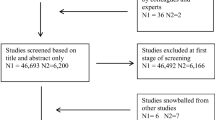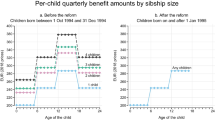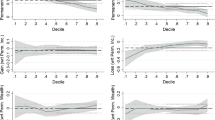Abstract
Data are presented on black family income and wealth that run counter to the claims that blacks have made substantial economic progress in recent years. The evidence reveals that not only has there been little in the way of real, sustained advances but that what few gains have been made are starting to erode.
Similar content being viewed by others
Notes
Richard B. Freeman, “Changes in the Labor Market for Black Americans, 1948—72,”Brookings Papers on Economic Activity 1 (1973a):67–132; Richard B. Freeman, “Decline in Labor Market Discrimination and Economic Analysis,”American Economic Review 63 (May 1973b):280-86; Richard B. Freeman, “Black Economic Progress After 1964: Who Gained and Why,”National Bureau of Economic Research Working Paper No. 282 (October 1978); James P. Smith and Finis Welch, “Black-White Male Wage Ratios: 1960-1970,”American Economic Review 67 (June 1977): 323-38; James P. Smith and Finis Welch, “Race Differences in Earnings: A Survey and New Evidence,” R-2295-NSF (Santa Monica, CA: Rand Corporation, March 1978); James P. Smith and Finis Welch,Closing the Gap: 40 Years of Black Economic Progress (Santa Monica, CA: Rand Corporation, February 1986).
Richard Butler and James J. Heckman, “The Government’s Impact on the Labor Market Status of Black Americans: A Critical Review,” in Leonard Hausman, et al., eds.Equal Rights and Industrial Relations (Madison, Wisc: Industrial Relations Research Association, 1977): 235–80; Richard Butler and James J. Heckman, “A New Look at the Empirical Evidence that Government Policy Has Shifted the Aggregate Relative Demand Function in Favor of Blacks,” unpublished manuscript, University of Chicago, June 1978; William A. Darity, Jr. and Samuel L. Myers, Jr., “Changes in Black-White Income Inequality: A Decade of Progress?”The Review of Black Political Economy (Summer 1980): 355-79; William A. Darity, Jr., “Illusions of Black Economic Progress,”The Review of Black Political Economy (Summer 1980): 153-68; William A. Darity, Jr., “The Human Capital Approach to Black-White Earnings Inequality: Some Unsettled Questions,”Journal of Human Resources 17 (Winter 1982): 72-94; Jeremiah Cotton, “Opening the Gap: The Decline in Black Economic Indicators in the 1980’s,” unpublished manuscript, University of Massachusetts-Boston (December 1988).
Katherine L. Bradbury and Lynn E. Browne, “Black Men in the Labor Market,”New England Economic Review (March/April 1986): 32-42; Cotton,op. cit.
RobertB. Hill, “Black Families in the 1970s,”The Urban League Review (Summer 1980), p. 45.
Loc. cit.
Frances Fox Piven and Richard B. Cloward,Regulating the Poor (New York: Vintage, 1971).
About this article
Cite this article
Cotton, J. The declining relative economic status of black families. Rev Black Polit Econ 18, 75–85 (1989). https://doi.org/10.1007/BF02717886
Issue Date:
DOI: https://doi.org/10.1007/BF02717886




